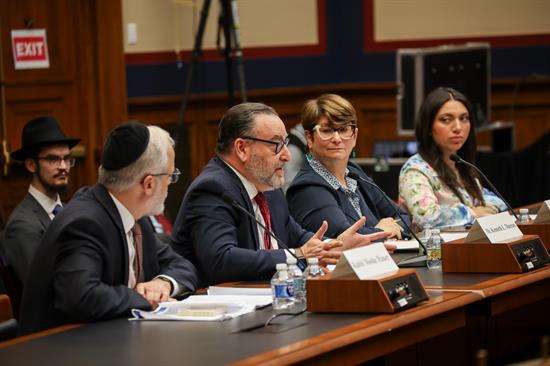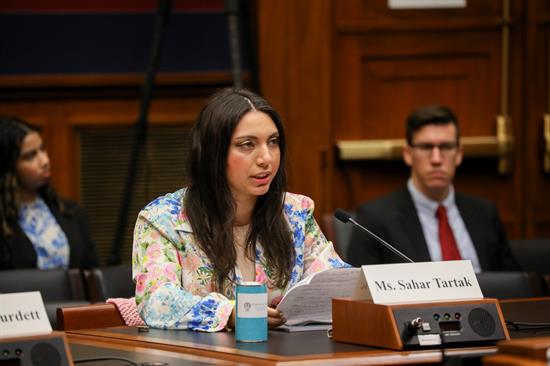E&W Blog
Hearing Recap: Antisemitism on Campus Edition
WASHINGTON, D.C.,
November 14, 2023
Today, the Higher Education and Workforce Development Subcommittee convened to discuss the modern manifestation of one of history’s greatest evils: the scourge of antisemitism on college campuses.
The American founding is defined by its commitment to the values of political liberty, equality, and toleration. Recent pro-Hamas university demonstrations have shown that not even the great American experiment is immune to the scourge of antisemitism.
The revelation is unsettling for many Jewish-Americans, especially university students. To them, antisemitism on campus is a stark reminder of the Jewish people’s history of persecution. Chairman Burgess Owens (R-UT) led the hearing by describing and denouncing cases of anti-Jew hatred on campus. “Swastikas graffitied on campus. Jewish students being segregated in classrooms by their professors. Jewish students at New York City’s Cooper Union being forced to lock themselves in the college library, and later escorted out a back door. What is at the core of this problem?” he questioned. The Committee turned to Jewish leaders for answers. The featured testimony today came from Rabbi Moshe Hauer, Executive Vice President of the Orthodox Union; Kenneth L. Marcus, Esq., Founder and Chairman of the Brandeis Center; and Sahar Tartak, a Jewish student at Yale University. In her opening testimony, Ms. Tartak described her personal college experience as a vocal Israel supporter of orthodox Jewish-Persian descent. She recalled the death threats she received due to her Jewish activism and the response from the university, which refused to provide her protection. Moreover, the Yale administration explicitly sponsored anti-Israel events in which attendees refused to acknowledge Hamas as a terrorist organization. In Mr. Marcus’s opening testimony, he coined the phrase “October 6th thinking” to describe the old paradigm of Jewish thinking which collapsed following the tragic events of October 7th. He continued, “When the problem is exceptional and unprecedented, the solutions need to be unprecedented and exceptional.” Indeed, in this heightened period of antisemitism, a heightened response is required. Turning to questions, Members shared their deep concerns with the university administrators and how they potentially color the views of their students. Rep. Glenn Grothman (R-WI) asked, “Do you feel these people [DEI officers] are contributing to anti-Israel sentiment?” In response, Mr. Marcus highlighted three fundamental problems with DEI ideology. First, “DEI programs often do not even mention antisemitism or Jewish identity in their [education] programs.” Second, “Often DEI professionals, especially in higher education, have strong anti-Israel views.” And third, “The entire ideology is structured too often against the Jewish people.” DEI ideology has a profound impact on all areas of campus life. To gauge the rot of antisemitism in the student body, Rep. Bob Good (R-VA) questioned Ms. Tartak, “What would you estimate the ratio to be of students on campus that would be pro-Israel versus pro-Hamas?” Ms. Tartak estimated, “Pro-Hamas? As in, would show up to a rally shouting something along the lines of, quote, verbatim, ‘Resistance is Justified,’ — twenty percent of the student body.” Even one Yale student equivocating over the murder of women and babies is horrific. Twenty percent is unconscionable. After articulating how antisemitism is engrained across all levels of universities—from administrators to faculty to student—witnesses offered solutions. In an exchange with Mr. Marcus, Rep. Brandon Williams (R-NY) asked, “Can you provide any direction on whether federal funds can be removed from universities that continue to be these hotbeds of antisemitism?” Mr. Marcus responded, “The first step means taking action, which can mean beginning with self-directed investigations. It can mean establishing a compliance review. You cannot even get to the point that you’re discussing, Congressman Williams, unless you proactively take those initiatives, and that’s what we would want to see the Education Department do.” Yet so far, the Education Department has demonstrated a complete lack of urgency to combat antisemitism. Title VI of the Civil Rights Act expressly prohibits racial and national origin discrimination on campus; it’s time the Biden administration uses this tool to combat all discrimination, not just the forms that fit conveniently into the woke agenda. Yet, it has failed to move aggressively to address the incidents we have seen over the last month. In the words of Rabbi Hauer, “We believed that the United States of America, built as it is on the principles of liberty and freedom and civil rights, would never spit us out.” Tolerance once made America a shining city on the hill for the rest of the world. In the absence of tolerance on campus, American universities live in the shadow cast by ideologies of hatred and fear. Finally, Ms. Tartak posed the question to the Committee: “Do not abandon your Jewish student constituents during this crisis. Academia has turned its back on us. Will you do the same?”
Bottom Line: The Committee is dedicated to eradicating the scourge of antisemitism on college campuses. |


